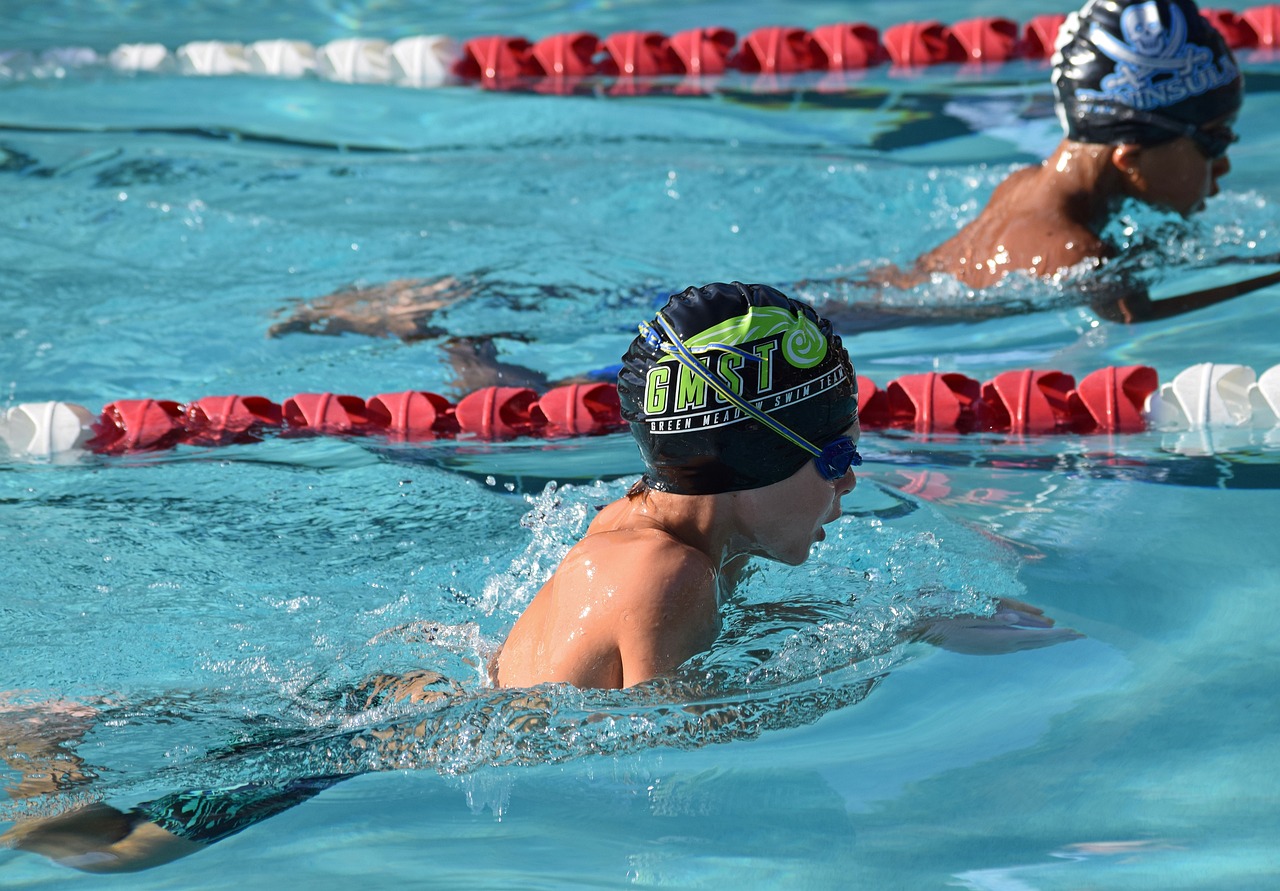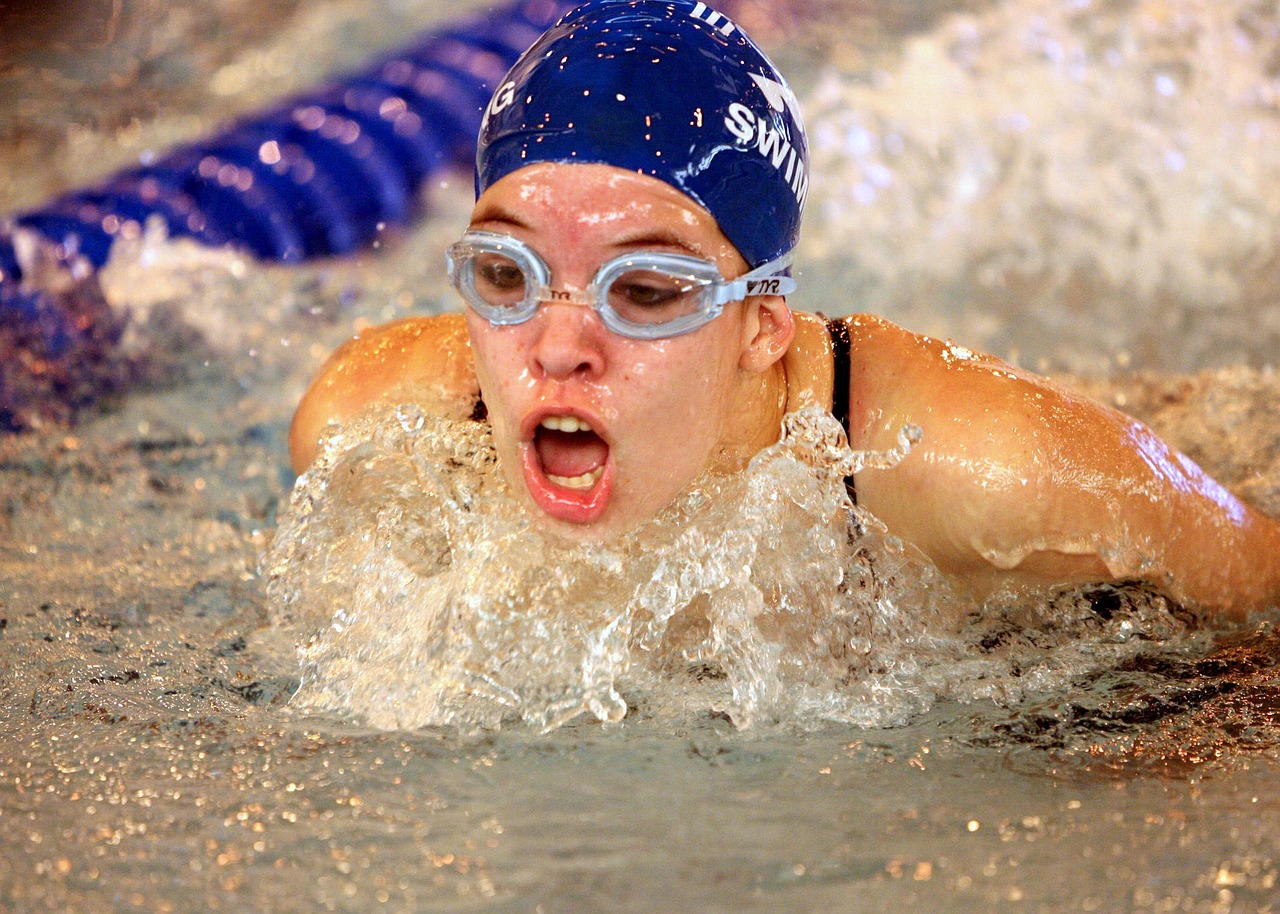Swimmer’s Sportsmanship Qualities: 15 Swimmer’s Sportsmanship Qualities That Define A Great Swim Athlete
In the world of competitive swimming, where athletes swim through the water effortlessly, there’s more to a swimmer’s success than just winning races.
Beyond the medals and records, it’s the heart and spirit of true sportsmanship that truly defines a great swim athlete.
A great swim athlete is not just measured by their speed and technique in the water, but also by their sportsmanship.
Advertisements
In this blog article, we will reveal fifteen swimmer’s sportsmanship qualities that define and make a great swim athlete.
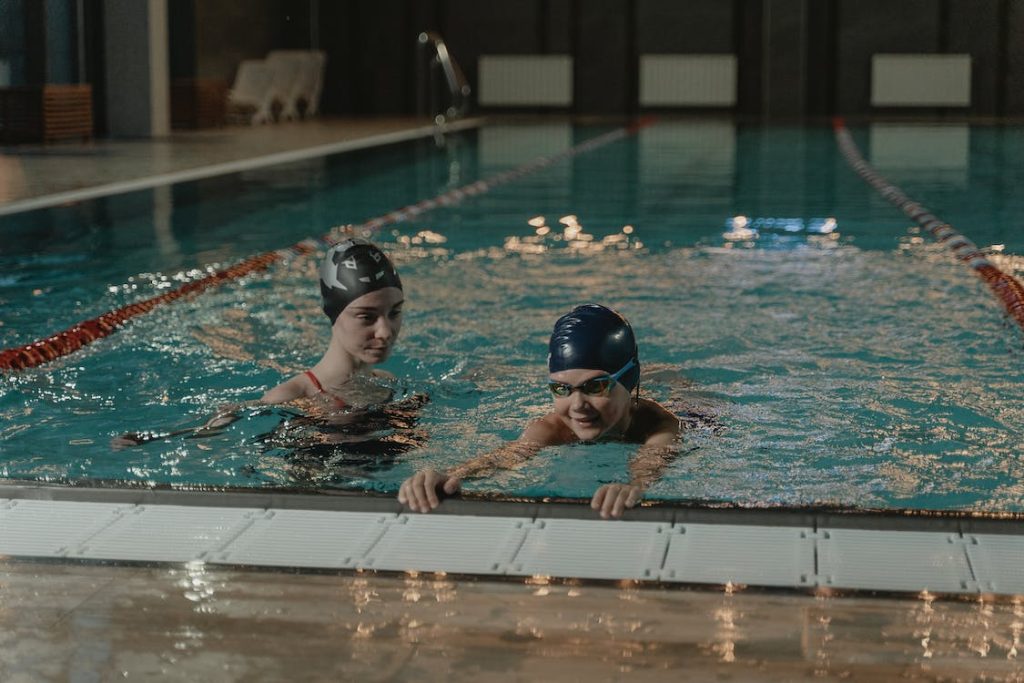
These qualities, which are often, overlooked but undeniably important, form the backbone of remarkable swimmers who inspire and uplift the young generation both inside and outside the pool.
Imagine the poolside atmosphere at a swimming event, full of excitement and cheers from the stands, the anticipation in the air, and the adrenaline pumping through the veins of dedicated competitors.
In these electrifying moments, we witness not only the physical abilities of these swimmers but also their expression of true sportsmanship.
Advertisements
Whether you are a seasoned swimmer looking to develop your skills or simply an enthusiast cheering from the sidelines, read through this as we reveal the essential swimmer’s sportsmanship qualities that make not only great athletes but also role models worth emulating.
The Importance of True Sportsmanship in Swimming
Swimming, being a largely individual sport, thrives on the foundation of sportsmanship. It helps maintain a healthy competitive environment where respect is the currency and integrity is the winning trophy.
Below, we explore the importance of sportsmanship in swimming:
- Upholding Ethical Conduct:
At the heart of true sportsmanship lies ethical conduct. Swimmers who express this spirit prioritize fair play, honesty, and integrity in every aspect of their sporting journey.
Such athletes not only showcase their talent and skills but also inspire others with their commitment to playing by the rules, even in high-pressure situations.
- Building Stronger Character:
Participating in swimming competitions can be both physically and mentally demanding. Through true sportsmanship, swimmers develop resilience, discipline, and perseverance.
Overcoming challenges and maintaining composure in the face of defeat or adversity helps build a stronger character, essential traits that extend beyond the pool into all aspects of life.
- Fostering Positive Team Dynamics:
Swimming is often seen as an individual sport, but at the same time, it is also an integral part of many swim teams and clubs.
True sportsmanship encourages athletes to support and uplift their teammates, promoting a positive team dynamic.
In a supportive environment, swimmers can excel collectively, creating a sense of unity and connection that makes the swimming experience more fulfilling for everyone involved.
- Setting Positive Examples for Young Athletes:
Swimming is a sport that attracts a diverse range of participants, including young aspiring athletes. When seasoned swimmers exhibit true sportsmanship, they serve as role models for the next generation.
By witnessing respectful behavior, young athletes are more likely to adopt similar values and attitudes, promoting a cycle of sportsmanship that continues to exist throughout the swimming community.
- Enhancing the Joy of Competition:
The joy of competition lies not just in victory, but in the shared experience of pursuing excellence with fellow athletes.
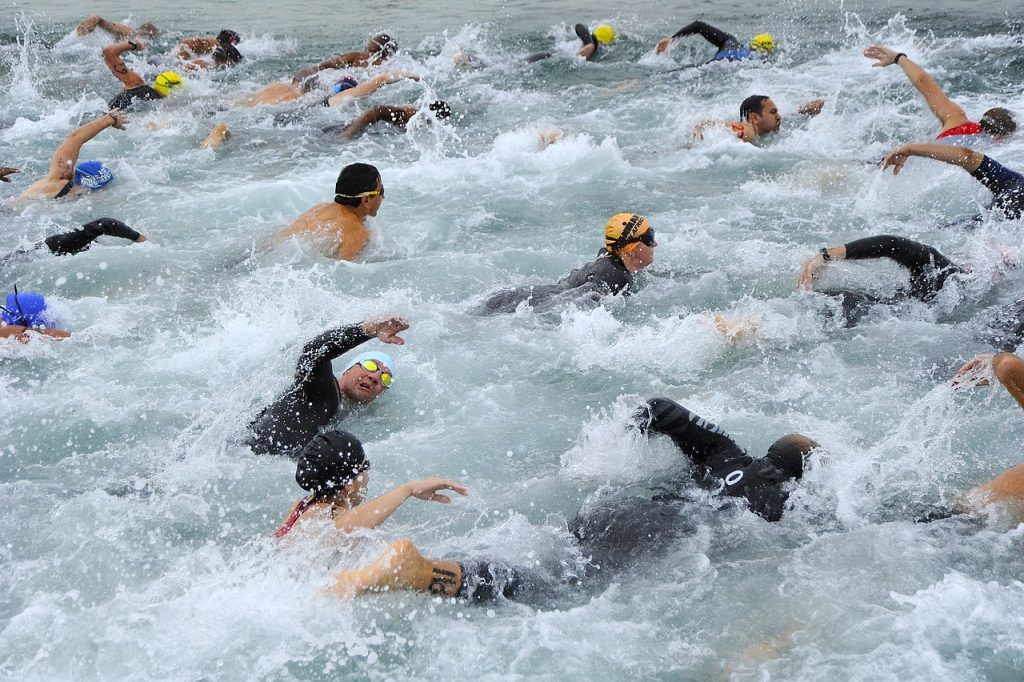
True sportsmanship encourages friendly rivalries and mutual respect between competitors.
Swimmers who embrace these values not only celebrate their own successes but also appreciate the achievements of others, making the competition a celebration of talent and dedication.
- Strengthening the Swimming Community:
Swimming is a tight-knit community, and true sportsmanship serves as a glue that binds its members together.
When swimmers demonstrate respect for coaches, officials, and fellow competitors, they create an inclusive and supportive atmosphere.
This sense of unity enriches the swimming community, making it an environment where all individuals can thrive and find belonging.
- Leaving a Lasting Legacy:
The impact of true sportsmanship in swimming goes beyond individual accolades and extends to a swimmer’s lasting legacy.
Athletes who express great sportsmanship leave behind a positive impression that extends well beyond their competitive years.
They are remembered not just for their victories, but for the way they conducted themselves as athletes and as human beings.
15 Swimmer’s Sportsmanship Qualities That Define A Great Swim Athlete
- Respect for Competitors:
One of the fundamental sportsmanship qualities that define a great swim athlete is their respect for their competitors.
They understand that each swimmer has put in hard work and dedication to reach their level of performance.
A true champion appreciates their rivals and treats them with dignity, regardless of the outcome.
- Grace in Victory and Defeat:
A great swim athlete displays grace in both victory and defeat. When they win, they celebrate with humility, acknowledging the efforts of their competitors.
In times of defeat, they accept the results with grace, taking it as an opportunity to learn and improve.
- Encourages Team Spirit:
While swimming is often seen as an individual sport, a great swim athlete recognizes the importance of team spirit.
They motivate and uplift their teammates, promoting a positive and supportive team environment. A strong team dynamic can lead to better performances collectively.
- Sportsmanship towards Officials:
Respecting and cooperating with officials is crucial for any swim athlete.
Great swimmers understand that officials are there to ensure fairness and adherence to the rules. They communicate with officials respectfully, even if they disagree with a decision.
- Shows Gratitude and Appreciation:
Gratitude is a key sportsmanship quality that sets apart a great swim athlete.
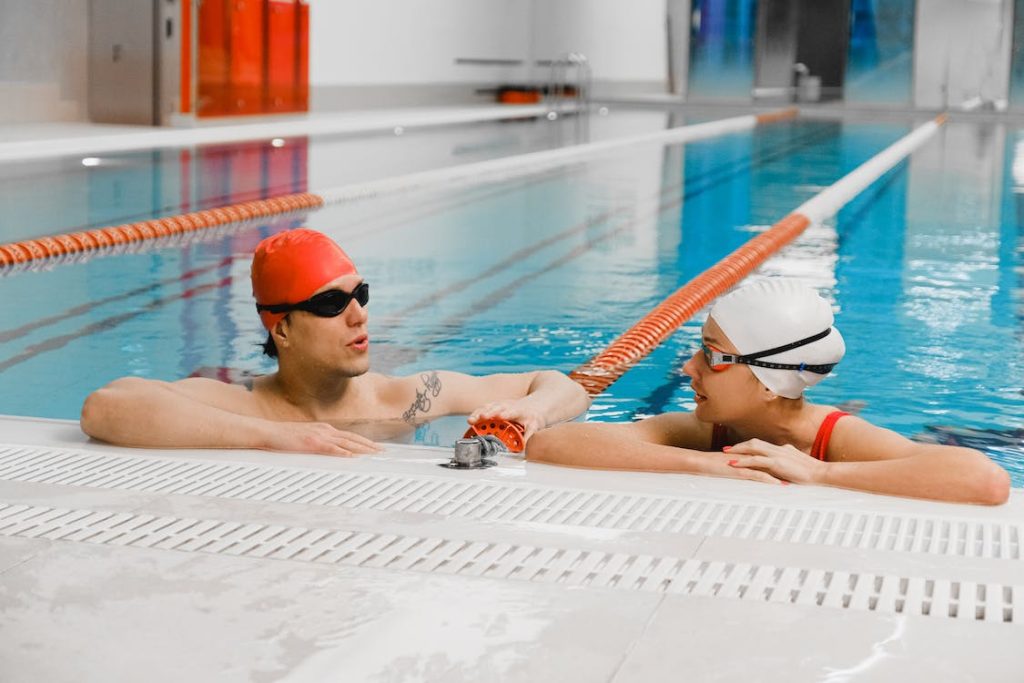
Great swimmers express appreciation towards their coaches, teammates, support staff, and everyone who contributes to their journey.
Gratefulness helps create a harmonious and encouraging atmosphere.
- Helps Others Improve:
A remarkable swim athlete goes beyond personal success and extends a helping hand to others.
They mentor and guide junior swimmers, sharing their knowledge and experience to help them improve their skills and performance.
- Takes Responsibility:
A great swim athlete takes responsibility for their actions, whether it’s during training or competition. They understand the impact of their behavior on the team and the sport’s reputation as a whole.
Owning up to mistakes and working towards improvement is a testament to their sportsmanship.
- Demonstrates Resilience:
Swimming is a challenging sport that requires mental and physical resilience.
A great swim athlete doesn’t give up easily, even in the face of setbacks or disappointments. They bounce back stronger, showing determination and perseverance.
- Displays Good Sportsmanship in Victory and Defeat:
Sportsmanship is not only about how one reacts to defeat but also how they behave in victory.
A great swim athlete remains humble and respectful when they achieve success. They acknowledge the efforts of their competitors and refrain from boastfulness.
- Promotes Fair Play:
A great swim athlete is an ambassador of fair play. They adhere to the rules of the sport and discourage any form of cheating or unsportsmanlike behavior among their peers.
Their commitment to fair play increases the overall integrity of the swimming community.
- Supports Inclusivity:
A great swim athlete embraces the importance of inclusivity in the sport. They actively promote diversity and respect for all individuals, regardless of their background or abilities.
By fostering an inclusive environment, they encourage more people to participate in swimming and contribute to its growth as a sport.
- Demonstrates Sportsmanship in Training:
Sportsmanship is not confined to competitive events alone; it extends to training sessions as well.
A great swim athlete expresses sportsmanship during practice by encouraging teammates, offering constructive feedback, and maintaining a positive attitude even during challenging training sessions.
- Respects Pool Facilities and Equipment:
An often overlooked aspect of sportsmanship is how athletes treat pool facilities and equipment.
A great swim athlete shows respect for the venue, ensuring it is kept clean and tidy. They handle equipment responsibly and report any damage to maintain a safe and conducive training environment for everyone.
- Exhibits Patience and Understanding:
Swimming requires immense dedication and patience to achieve success.
A great swim athlete understands the importance of patience, especially during times of slow progress or when overcoming challenges.
They offer support and understanding to teammates going through tough times, fostering a sense of camaraderie.
- Engages in Community Outreach:
A truly exceptional swim athlete recognizes their role as a role model in the community.
They actively engage in community outreach programs, sharing their passion for swimming with others and inspiring the next generation of swimmers. By giving back, they create a positive impact beyond the pool.
READ ALSO: 10 Secrets to Help You Choose the Best Time for Swimming
The Impact of Sportsmanship Qualities on Swimmer’s Personal Growth and Relationships
Sportsmanship qualities play a significant role in shaping a swimmer’s character, extending far beyond their athletic achievements.

In the competitive world of swimming, the values of respect, humility, and teamwork can greatly influence a swimmer’s personal growth and relationships.
Below are the impact of sportsmanship qualities on swimmer’s personal growth and relationships:
- It Cultivates Respect for Others:
One of the core sportsmanship qualities is respect for others, including competitors, coaches, officials, and teammates.
By cultivating this virtue, swimmers learn to appreciate the efforts and dedication of others, regardless of the outcome.
This respect extends beyond the pool, creating a sense of empathy and understanding in various aspects of life.
Respectful swimmers are more likely to build positive relationships and earn the admiration of their peers.
- Expressing Humility and Grace:
Sportsmanship teaches swimmers to handle victories and defeats with humility and grace. Embracing these qualities prevents arrogance in success and discouragement in failure.
A swimmer who displays humility in victory gains the respect of others, while one who exhibits grace in defeat becomes an inspiration for resilience and determination.
- Building Confidence and Resilience:
Sportsmanship qualities contribute to the development of a swimmer’s confidence and resilience.
When facing challenges, a swimmer with good sportsmanship remains optimistic, drawing strength from their training and the support of their teammates.
This resilience cut across into other life situations, empowering swimmers to tackle obstacles with determination and self-assurance.
- Enhancing Communication Skills:
Effective communication is vital for any successful athlete. Swimmers with strong sportsmanship qualities tend to be better communicators.
They express themselves with clarity, listen to others with empathy, and provide constructive feedback to their teammates.
These communication skills extend to their relationships outside of swimming, creating healthy and meaningful connections.
- Developing a Positive Mindset:
The impact of sportsmanship qualities on a swimmer’s personal growth includes the development of a positive mindset.
By maintaining a positive outlook, swimmers are more likely to stay motivated, push their boundaries, and achieve their goals.
This positivity cut across into other aspects of their lives, enabling them to handle challenges with optimism.
- Inspiring Leadership Qualities:
Sportsmanship qualities are often intertwined with leadership skills. A swimmer who shows respect, humility, and teamwork naturally becomes a role model for their peers.
Their positive influence and ability to motivate others create a conducive environment for growth and success within the team.
Popular and Legendary Swimmers That Have Shown Exceptional Sportsmanship
Numerous legendary swimming athletes have shown sportsmanship qualities in top swimming competitions.
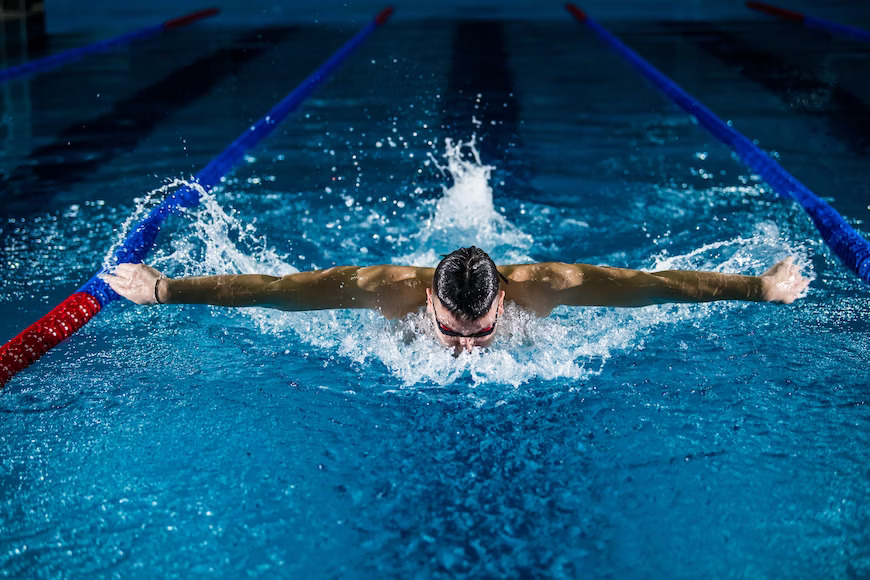
From showing grace in victory to supporting their competitors, these swimmers have left a lasting impact on the sport, inspiring fans and fellow athletes alike.
Below, we delve into the stories of some popular and legendary swimmers who have displayed exceptional sportsmanship qualities throughout their careers, setting a remarkable example for the swimming community. They include:
- Michael Phelps – The Gentleman of the Pool:
Michael Phelps, the most decorated Olympian of all time, is not only known for his record-breaking achievements but also for his exceptional sportsmanship.
In the 2008 Beijing Olympics, during the 100m butterfly final, Phelps narrowly secured the gold medal, while Serbian swimmer Milorad Čavić finished a close second.
Despite the intense rivalry, Phelps immediately congratulated Čavić and acknowledged his impressive performance.
This gracious act showcased Phelps’ respect for his competitors and sportsmanship beyond compare.
- Ian Thorpe – A Humble Champion:
Australian swimmer Ian Thorpe, fondly known as “Thorpedo,” was a dominant force in the pool during the late 1990s and early 2000s.
At the 2000 Sydney Olympics, Thorpe faced Dutch swimmer Pieter van den Hoogenband in the 200m freestyle final.
After losing the race by a mere 0.25 seconds, Thorpe congratulated his competitor and celebrated van den Hoogenband’s victory.
This display of humility and grace in defeat endeared him to fans worldwide and solidified his status as an ambassador of sportsmanship.
- Janet Evans – A Role Model of Respect:
Janet Evans, an American distance swimmer, achieved remarkable success during the late 1980s and early 1990s.
Her sportsmanship was evident in the 400m freestyle race at At the 1992 Summer Olympics in Barcelona.
Despite losing the race to German swimmer Dagmar Hase, Evans was quick to acknowledge the performance of her fellow swimmers and congratulate the medalists.
Her gracious attitude and genuine support for her competitors demonstrated the true essence of sportsmanship.
- Pieter van den Hoogenband – A Champion’s Respect:
Pieter van den Hoogenband, the Dutch swimming sensation, expressed sportsmanship in various instances throughout his career.
One such moment came during the 2004 Athens Olympics, where he defeated his idol, Ian Thorpe, in the 100m freestyle.
Despite his historic victory, van den Hoogenband immediately extended a hand of respect to Thorpe, showing admiration for the swimming legend he had just bested.
This act of sportsmanship reflected his appreciation for the sport’s history and the athletes who came before him.
- Missy Franklin – The Supportive Teammate:
American female swimmer Missy Franklin won hearts with her sportsmanship during the 2012 London Olympics.
After securing her gold medal in the 100m backstroke, Franklin displayed exceptional camaraderie by hugging and congratulating her teammate, silver medalist Emily Seebohm of Australia.
Her genuine happiness for her teammate’s achievement demonstrated the essence of sportsmanship as a celebration of excellence, regardless of nationality.
READ ALSO: 10 Shocking Lies About the Swimming Pool Chlorine
The Role of Coaches and Parents in Promoting Sportsmanship Among Young Swimmers
In the world of youth swimming, coaches and parents play key roles in shaping young swimmers’ characters and instilling essential values that extend beyond the pool.

In this section, we explore the significant role of coaches and parents in promoting sportsmanship qualities among young swimmers, creating an environment of respect, teamwork, and personal growth. These roles include:
- Leading by Example:
Coaches and parents serve as primary role models for young swimmers.
By displaying sportsmanship qualities in their behavior and interactions, they set a powerful example for the impressionable minds of young athletes.
When coaches and parents demonstrate respect, humility, and positive sportsmanship, they encourage their swimmers to follow suit.
- Focusing on Growth and Effort:
Coaches and parents should emphasize the importance of personal growth and effort rather than solely focusing on winning.
By celebrating individual improvements and achievements, young swimmers learn that success goes beyond trophies and medals. This mindset builds up resilience and determination, essential qualities for long-term success.
- Encouraging Empathy and Compassion:
Sportsmanship qualities extend beyond the pool, influencing young swimmers’ interactions with others in their daily lives.
Coaches and parents can promote empathy and compassion by encouraging their athletes to understand and support teammates going through challenging times.
Creating a supportive team environment reinforces the value of kindness and understanding.
- Encouraging Teamwork and Cooperation:
Coaches and parents can promote teamwork and cooperation among young swimmers.
By organizing relay races and team-building activities, young swim athletes learn the importance of working together toward a common goal.
This collaborative spirit extends to their relationships beyond the pool, creating a positive impact in their lives.
- Providing Constructive Feedback:
Coaches play a vital role in a swimmer’s development, and how they offer feedback can significantly influence their sportsmanship qualities.
Constructive criticism, delivered with empathy and support, helps young swimmers understand the importance of self-improvement and encourages them to embrace challenges with a positive attitude.
- Balancing Competition and Fun:
While competition is an essential aspect of sports, it is vital to balance it with the enjoyment of the sport itself.
Coaches and parents can ensure that young swimmers find joy in swimming by creating a nurturing and fun-filled training environment.
When young swim athletes have fun, they are more likely to develop a genuine love for the sport and remain committed to it in the long run.
The Benefits of Showing Sportsmanship Qualities in Competitive Swimming
- It Creates Positive Relationships:
Sportsmanship qualities, such as respect for competitors, coaches, and officials, create a positive and harmonious competitive environment.
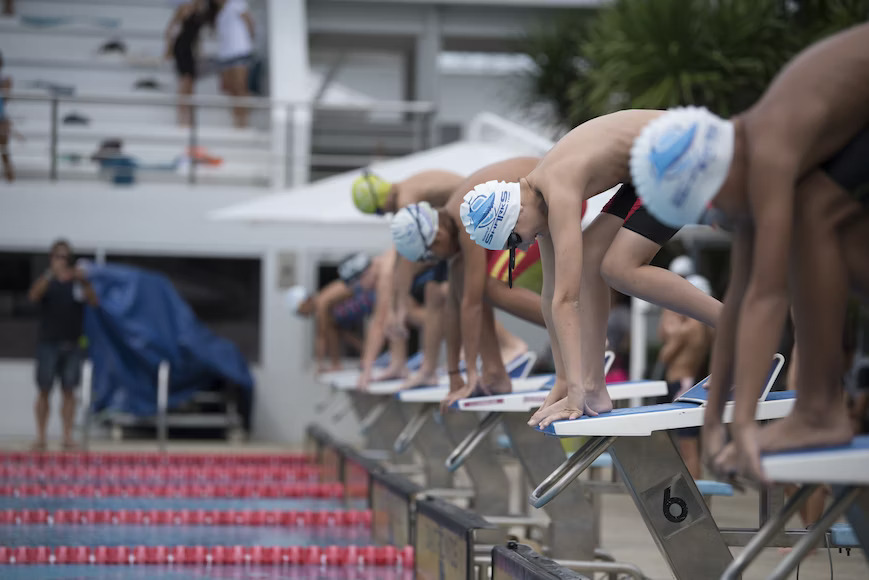
Swimmers who display genuine appreciation for their rivals not only build strong connections but also earn the respect and admiration of their peers.
These positive relationships contribute to a supportive network that can be invaluable during challenging times.
- It Builds Up Personal Growth:
In competitive swimming, victories and defeats are part of the journey. Embracing sportsmanship qualities, especially in moments of defeat, allows swimmers to view setbacks as opportunities for growth.
Instead of feeling disheartened, they analyze their performance, learn from mistakes, and become more resilient individuals, both in and out of the pool.
- It Improves Mental Resilience:
Competitive swimming can be mentally demanding, requiring athletes to stay focused and composed under pressure.
Sportsmanship qualities, such as humility and determination, contribute to the development of mental resilience.
A swimmer who remains humble in victory and steadfast in defeat is better equipped to handle the ups and downs of the sport, ultimately performing at their best.
- It Creates a Supportive Team Environment:
Sportsmanship qualities play a crucial role in shaping the team dynamics of a swimming squad.
Swimmers who value teamwork and support their teammates create a positive and encouraging environment.
This team camaraderie not only enhances the overall training experience but also leads to improved performances in relay events and team competitions.
- Gaining Respect from Peers and Coaches:
A swimmer who shows sportsmanship qualities gains the respect and trust of both their peers and coaches.
Coaches value athletes who not only excel in the pool but also demonstrate qualities that positively influence the team. As a result, these swimmers are often looked up to as role models, motivating others to follow their example.
- It Creates a Positive Reputation and Legacy:
In the competitive swimming community, a swimmer’s reputation is built not only on their swimming achievements but also on their conduct both on and off the pool deck.
Embracing sportsmanship qualities contributes to building a positive reputation as a fair and respectful competitor.
This reputation opens doors to opportunities, such as scholarships, sponsorships, and invitations to prestigious events.
READ ALSO: 10 Mind-Blowing Facts Every Parent Should Know About Teenager Swimming
READ ALSO: Essential Swimmer’s Shoulder Stretching Exercises to Relieve Swimmer’s Shoulder Pain
Conclusion
In conclusion, a great swim athlete is defined not just by their physical abilities, but also by their sportsmanship qualities.
Respect for competitors, grace in victory and defeat, team spirit, and gratitude are some of the essential attributes that set them apart.
By demonstrating good sportsmanship both in and out of the pool, they inspire others and contribute to a positive and enriching swimming environment.
Let us all strive to show these sportsmanship qualities and make swimming a sport known not just for its champions but also for its exemplary athletes.

